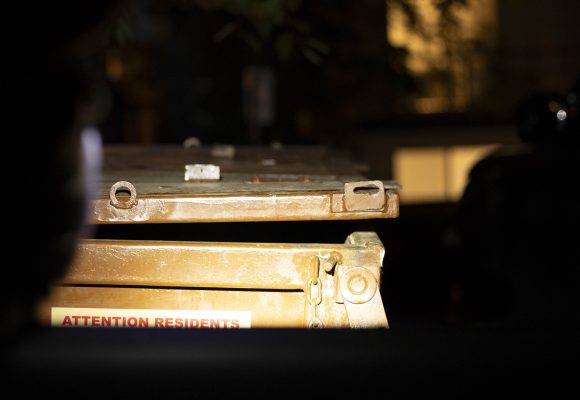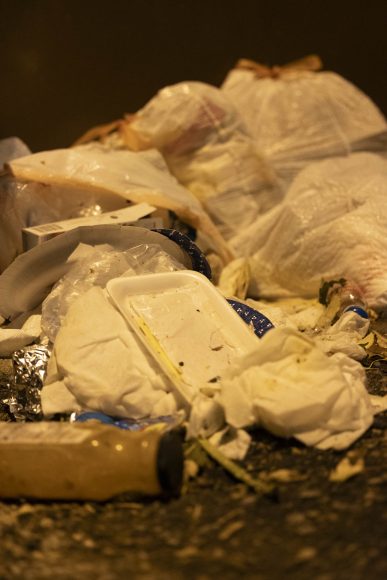
A dumpster that has not been properly locked to prevent bears from getting access to the trash inside on University Hill on Wednesday, Oct. 11, 2023. (Clementine Miller/CU Independent)
As the end of bear season, the period from mid-March to early November, nears, Boulder wildlife officials look to bring awareness to the trash issues that are increasing bear activity on University Hill.
“This is probably the highest bear activity year I have observed since I started working in this district,” said Samuel Peterson, the district wildlife manager in Boulder County.
Videos of bear sightings have circulated on the Barstool Buffs Instagram account and on Colorado news channels. On Sept. 12, a bear was sighted on the University of Colorado Boulder’s campus in a tree near the Engineering Center.
Boulder’s proximity to the Rocky Mountains makes it a more common area for bear sightings. According to the city of Boulder’s Bear Protection Ordinance, this vulnerability requires that the area west of Broadway Street and south of Sumac Avenue must use bear-resistant containers for compost and trash.
Peterson is one of the many officers who patrol the area, looking for bears and noting spots with repeating trash issues. During a ride-along with the CU Independent, he stopped to demonstrate bins that were improperly locked or food waste that was strewn outside of containers.

Colorado Parks and Wildlife District Wildlife Manager Samuel Peterson locks a dumpster on University Hill on Wednesday, Oct. 11, 2023. (Clementine Miller/CU Independent)
“I don’t think it’s malicious,” he said, referring to residents’ decisions to leave trash improperly stored away. “I think the issue is that people don’t understand what the vicious cycle is between trash and bears.”
This increase in bear activity generally occurs in early fall when bears are going through hyperphagia, where they consume up to 20,000 calories a day to prepare for hibernation. The food waste often found in the city is a major attraction for the bears during this time.
“I hear about someone seeing the bear near my house about once a week and I see the aftermath,” said Henry Westphal, a sophomore at CU Boulder who lives in the city ordinance zone.
Westphal said his unit received a $500 fine from the city for trash left out in the alley. However, he stated that this fine was given less than 24 hours after a bear came through his alleyway and knocked over trash bins.
“I was very, very angry,” he said. “I didn’t feel like it was justified because I feel like the city should relocate the bear instead.”
During the ride-along, Peterson said that assigning responsibility for trash issues is difficult as it is often ambiguous.
Jennifer Riley, Boulder’s code enforcement supervisor, said that if trash is properly locked up, it shouldn’t fall out of bins if knocked over by a bear.
“Unfortunately the wildlife can bear the biggest burden,” Riley said. From ingesting harmful substances to needing to be relocated or euthanized, trash-eating habits have serious risks for bears.
Damage to bins that prevents them from being secured, said Peterson, is easily fixed by calling Western Disposal, the company that is responsible for waste collection services and obligated by the city ordinance to repair any bin issues. The phone number for Western is found on the side of trash bins throughout the city of Boulder. Peterson said he has found them to be responsive to fixing issues.
The importance of dealing with trash issues, said Peterson, is that a conflict is inevitable when a bear hunkers down in one area, consuming trash. Both the bear and residents are at risk in this situation.
“I wish there was something I could do personally,” he said, “but there’s not enough time in my schedule to pick up all these bags of trash and put them somewhere else.”

Trash spills out of trash bags that have been placed in an alley on University Hill on Wednesday, Oct. 11, 2023. (Clementine Miller/CU Independent)
Peterson said he knows that the Boulder community wants to coexist with bears. The last thing he said he wants to do is have to kill one if it gets too habituated to a residential area. He referred to an article written by a fellow Colorado Parks and Wildlife Officer that recounted the emotions and buildup to the killing of a habituated bear.
“Between trying to have less waste and trying to store it better, those are the two best solutions,” he said.
As for Westphal, he said he is working on getting the trash fine appealed due to the circumstances under which it occurred.
“If people knew why it[trash storage] was an issue, I’m hopeful that they would take the extra ten seconds to make sure their trash can is latched,” said Peterson.
Contact breaking news editor Ann Marie Vanderveen at ann.vanderveen@colorado.edu.
